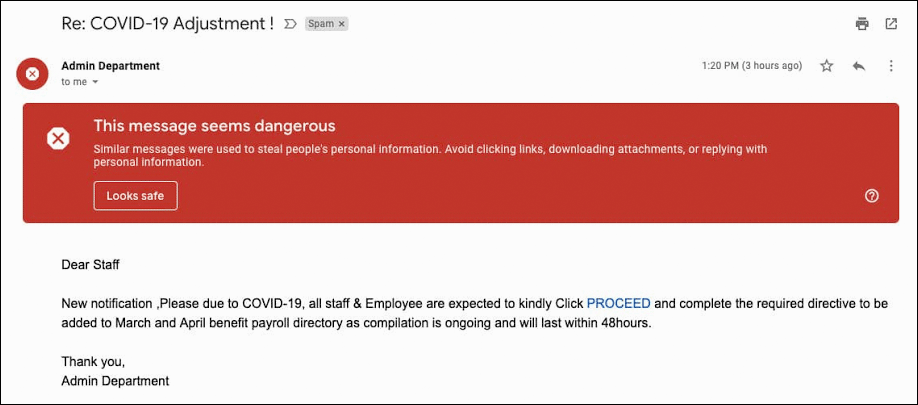

 The Washington Post recently published an article with a series of graphs showing the impact of the pandemic on various economic indicators, including unemployment, wages, air travel, grocery prices, home prices, and consumer sentiment. The article got me thinking about the impact of the pandemic on the broadband industry, and several important changes emerged from our collective pandemic experience.
The Washington Post recently published an article with a series of graphs showing the impact of the pandemic on various economic indicators, including unemployment, wages, air travel, grocery prices, home prices, and consumer sentiment. The article got me thinking about the impact of the pandemic on the broadband industry, and several important changes emerged from our collective pandemic experience.
 Counterfeiting is big business. A 2021 study by the Organisation for Economic Cooperation and Development (OECD) estimated that the international trade in counterfeit and pirated products was worth up to $464 billion in 2019, or around 2.5% of all world trade. A significant proportion of this trade occurs via digital channels, where global annual expenditure on eCommerce is more than $4 trillion.
Counterfeiting is big business. A 2021 study by the Organisation for Economic Cooperation and Development (OECD) estimated that the international trade in counterfeit and pirated products was worth up to $464 billion in 2019, or around 2.5% of all world trade. A significant proportion of this trade occurs via digital channels, where global annual expenditure on eCommerce is more than $4 trillion.
 Until the pandemic hit, I rarely thought about upload bandwidth. I mostly used upload bandwidth to send files to people, and I rarely cared if they received the files immediately -- I was happy as long as files got sent. But the pandemic changed everything for millions of people. All of a sudden, homes were unable to function well due to problems with uploading.
Until the pandemic hit, I rarely thought about upload bandwidth. I mostly used upload bandwidth to send files to people, and I rarely cared if they received the files immediately -- I was happy as long as files got sent. But the pandemic changed everything for millions of people. All of a sudden, homes were unable to function well due to problems with uploading.
 Hackers are using company domain names for malicious attacks more than ever before. Established research shows that phishing and related malware attacks most commonly occur from a compromised or hijacked legitimate domain name, a maliciously registered, confusingly similar domain name, or via email header spoofing. Domain security intelligence is the first line of defense in preventing domain cyberattacks.
Hackers are using company domain names for malicious attacks more than ever before. Established research shows that phishing and related malware attacks most commonly occur from a compromised or hijacked legitimate domain name, a maliciously registered, confusingly similar domain name, or via email header spoofing. Domain security intelligence is the first line of defense in preventing domain cyberattacks.
 In the 2021 Domain Security Report, we analyzed the trend of domain security adoption with respect to the type of domain registrar used, and found that 57% of Global 2000 organizations use consumer-grade registrars with limited protection against domain and DNS hijacking, distributed denial of service (DDoS), man-in-the-middle attacks (MitM), or DNS cache poisoning. On average, the adoption of domain security controls is two times higher for enterprise-class registrars than for those using consumer-grade registrars.
In the 2021 Domain Security Report, we analyzed the trend of domain security adoption with respect to the type of domain registrar used, and found that 57% of Global 2000 organizations use consumer-grade registrars with limited protection against domain and DNS hijacking, distributed denial of service (DDoS), man-in-the-middle attacks (MitM), or DNS cache poisoning. On average, the adoption of domain security controls is two times higher for enterprise-class registrars than for those using consumer-grade registrars.
 As we work on this final CircleID essay addressing the last four Articles in the UDHR, we explore how the UDHR provides the principles on which to build the rights and responsibilities of digital citizenship and bring integrity and trust to cyberspace and the Internet ecosystem. We reflect on what we have learned. For us, the authors of this series, we are reminded that trust in the processes of government, business entities, and society is central to the wellbeing of society, our communities, our families, and ourselves.
As we work on this final CircleID essay addressing the last four Articles in the UDHR, we explore how the UDHR provides the principles on which to build the rights and responsibilities of digital citizenship and bring integrity and trust to cyberspace and the Internet ecosystem. We reflect on what we have learned. For us, the authors of this series, we are reminded that trust in the processes of government, business entities, and society is central to the wellbeing of society, our communities, our families, and ourselves.
 High-speed fiber Internet subscriptions surpassed copper-wire DSL connections across OECD countries for the first time in 2020 as the need to move work and home life activities online during the COVID-19 pandemic led to a record 21.15 million new fixed broadband connections (including fiber, DSL, cable, and others) in the year to end-December 2020.
High-speed fiber Internet subscriptions surpassed copper-wire DSL connections across OECD countries for the first time in 2020 as the need to move work and home life activities online during the COVID-19 pandemic led to a record 21.15 million new fixed broadband connections (including fiber, DSL, cable, and others) in the year to end-December 2020.
 There is a recent industry phenomenon that could have major impacts on ISP networks in the relatively near future. There has been an explosion of households that subscribe to gigabit data plans. At the end of 2018, only 1.8% of US homes subscribed to a gigabit plan. This grew to 2.8% by the end of 2019. With the pandemic, millions of homes upgraded to gigabit plans in an attempt to find a service that would support working from home.
There is a recent industry phenomenon that could have major impacts on ISP networks in the relatively near future. There has been an explosion of households that subscribe to gigabit data plans. At the end of 2018, only 1.8% of US homes subscribed to a gigabit plan. This grew to 2.8% by the end of 2019. With the pandemic, millions of homes upgraded to gigabit plans in an attempt to find a service that would support working from home.
 As we face another surge in the Delta variant within the COVID-19 pandemic, the traditional face-to-face schools of Internet Governance continue to be forced to rethink their typical programs and adapt their modalities of delivering Internet Governance education. Everyone from the administrators, educators and the participants needed to adapt to the new reality of online learning and the various digital platforms with its associated cost and benefits.
As we face another surge in the Delta variant within the COVID-19 pandemic, the traditional face-to-face schools of Internet Governance continue to be forced to rethink their typical programs and adapt their modalities of delivering Internet Governance education. Everyone from the administrators, educators and the participants needed to adapt to the new reality of online learning and the various digital platforms with its associated cost and benefits.
 Afnic, the French Network Information Centre and manager of the .fr TLD, has just published its Afnic's Global Domain Name Market in 2020 Report on the global domain market in 2020. The study is based on ICANN statistics, information from registries, specialized websites, and its own research. This is an overview of global trends and an analysis of the mechanisms at work during the health crisis.
Afnic, the French Network Information Centre and manager of the .fr TLD, has just published its Afnic's Global Domain Name Market in 2020 Report on the global domain market in 2020. The study is based on ICANN statistics, information from registries, specialized websites, and its own research. This is an overview of global trends and an analysis of the mechanisms at work during the health crisis.
 The ongoing COVID-19 pandemic has been a major contextual factor of global internet governance discussions over the past year, and it appears that discussions in ICANN are no exception. Threats to the integrity and security of the DNS have become a regular topic of debate within the ICANN community. In recent months, these discussions have increasingly focused on the idea of 'DNS abuse' and, more specifically, COVID-19-related DNS abuse.
The ongoing COVID-19 pandemic has been a major contextual factor of global internet governance discussions over the past year, and it appears that discussions in ICANN are no exception. Threats to the integrity and security of the DNS have become a regular topic of debate within the ICANN community. In recent months, these discussions have increasingly focused on the idea of 'DNS abuse' and, more specifically, COVID-19-related DNS abuse.
 Phishing scams are nothing new in the online security world and show no signs of subsiding. The scam starts when a fraudster sends a communication purporting to originate from a trusted provider and encourages the recipient, often with a conveyed sense of urgency, to click a link. That link leads to a fake site, usually intended to collect confidential login credentials or other personal information. In similar scams, the mail may encourage the recipient to open an attachment loaded with malicious content.
Phishing scams are nothing new in the online security world and show no signs of subsiding. The scam starts when a fraudster sends a communication purporting to originate from a trusted provider and encourages the recipient, often with a conveyed sense of urgency, to click a link. That link leads to a fake site, usually intended to collect confidential login credentials or other personal information. In similar scams, the mail may encourage the recipient to open an attachment loaded with malicious content.
 The growth of broadband customers has looked spectacular over the past year during the pandemic. It's easy to chalk up higher broadband customers nationwide to the need for households to be connected during the pandemic. But as I look back on what's happened during the last year, I can't help but wonder if the broadband stats we are seeing are somehow overinflated.
The growth of broadband customers has looked spectacular over the past year during the pandemic. It's easy to chalk up higher broadband customers nationwide to the need for households to be connected during the pandemic. But as I look back on what's happened during the last year, I can't help but wonder if the broadband stats we are seeing are somehow overinflated.
 The Mozilla Internet Health Report is packed with interesting statistics about the state of the Internet. Reports like this one remind us that broadband is a worldwide issue that is much larger than the US broadband industry I write about every day. The report contains a lot of interesting facts: A little more than half of the planet is still not connected to the Internet. As a planet, we still have a long way to go. While the largest percentage of a region still not online is in Africa, by sheer numbers, most of those still not connected are in Asia...
The Mozilla Internet Health Report is packed with interesting statistics about the state of the Internet. Reports like this one remind us that broadband is a worldwide issue that is much larger than the US broadband industry I write about every day. The report contains a lot of interesting facts: A little more than half of the planet is still not connected to the Internet. As a planet, we still have a long way to go. While the largest percentage of a region still not online is in Africa, by sheer numbers, most of those still not connected are in Asia...
 This article is Part 8 of the series of articles discussing human rights in the digital age and published here on CircleID.2 When we commenced this analysis of the UDHR, and the relevance of its principles to our rights and duties within the Internet ecosystem, we committed ourselves to work through the UDHR one Article at a time. With this Part 8 we are four-fifths through that task.
This article is Part 8 of the series of articles discussing human rights in the digital age and published here on CircleID.2 When we commenced this analysis of the UDHR, and the relevance of its principles to our rights and duties within the Internet ecosystem, we committed ourselves to work through the UDHR one Article at a time. With this Part 8 we are four-fifths through that task.
 Google Reports 18 Million Daily COVID-19 Related Malware, Phishing Emails Per Day
Google Reports 18 Million Daily COVID-19 Related Malware, Phishing Emails Per Day Zoom Faces Class-Action Lawsuit, Accused of Overstating Its Privacy Standards
Zoom Faces Class-Action Lawsuit, Accused of Overstating Its Privacy Standards